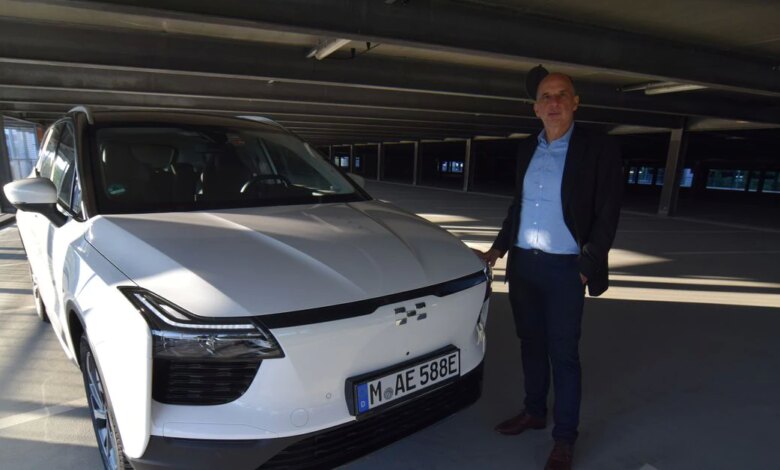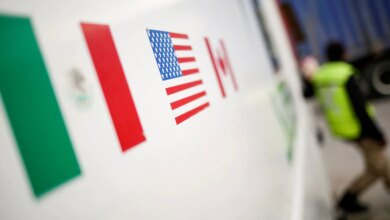China’s electric carmakers make their move on Europe

MUNICH/BEIJING, Sept 30 (Reuters) – China’s electrical carmakers are darting into Europe, hoping to catch conventional auto giants chilly and seize a slice of a market supercharged by the continent’s drive in direction of zero emissions.
Nio Inc , amongst a small group of challengers, launches its ES8 electrical SUV in Oslo on Thursday – the primary foray exterior China for a corporation that’s just about exceptional in Europe though it is valued at about $57 billion.
Different manufacturers unfamiliar to many Europeans which have began promoting or plan to promote automobiles on the continent embody Aiways, BYD’s Tang, SAIC’s MG, Dongfeng’s VOYAH, and Nice Wall’s ORA.
But Europe, a crowded, aggressive automotive market dominated by well-known manufacturers, has proved elusive for Chinese language carmakers up to now. They made strategic slips and likewise contended with a notion that China, lengthy related to low-cost mass-production, couldn’t compete on high quality.
Certainly, Nio Chief Govt William Li informed Reuters he foresees a protracted street to success in a mature market the place it’s “very troublesome to achieve success”.
Chinese language carmakers might have as much as a decade to “acquire a agency foothold” in Europe, the billionaire entrepreneur mentioned – a forecast echoed by He Xiaopeng, CEO of electrical car (EV) maker Xpeng who informed Reuters his firm wants 10 years “to put basis” on the continent.
These new gamers, lots of which have solely ever made electrical autos, imagine they’ve a window of alternative to lastly crack the profitable market.
Whereas electrical automotive gross sales within the European Union greater than doubled final 12 months and jumped 130% within the first half of this 12 months, conventional producers are nonetheless step by step shifting their giant car ranges over to electrical and have but to flood the thirsty market with fashions.
“The market is just not that busy but, should you evaluate it with combustion-engine fashions the place every of the main carmakers has an entire vary of autos,” mentioned Alexander Klose, who heads the overseas operations of Chinese language electrical car maker Aiways.
“That’s the place we predict we have now a chance,” he added on a drive round Munich in a U5, a crossover SUV on sale in Germany, the Netherlands Belgium and France.
The U5 begins at 30,000 euros ($35,000) in Germany – under the common new automotive value and most native EV costs – earlier than factoring in 9,000 euros in EV subsidies – and is available in simply 4 colors and two trim ranges to reduce prices.
‘GERMAN PEOPLE BUY GERMAN CARS’
As Chinese language carmakers gear as much as enter Europe, they’re making an attempt out totally different enterprise fashions, from counting on importers, low-cost retail choices or build up extra conventional dealerships.
The brand new actuality that high Western carmakers like BMW and Tesla Inc now produce automobiles in technological powerhouse China has seemingly undermined previous perceptions of low high quality workmanship – although they are often arduous to shake.
Antje Levers, a trainer who lives in western Germany close to the Dutch border, and her husband owned a diesel Chevrolet Orlando however wished a greener possibility. They purchased an Aiways U5 final 12 months after loads of analysis to fend off criticism for not shopping for native, and loves its dealing with and low operating prices.
She mentioned individuals had informed her: “You possibly can’t purchase a Chinese language automotive, they’re plastic and low-cost and don’t help German jobs.” However she feels that’s not true in a worldwide automotive business the place you discover German auto elements in Chinese language automobiles and vice versa.
“German individuals purchase German automobiles, so to purchase a Chinese language automotive you’ll want to have just a little braveness,” the 47-year-old added. “Typically you simply must be open for brand spanking new issues.”
NIO LANDS IN NORWAY WITH NOMI
Nio launches its ES8 electrical SUV alongside a NIO Home – part-showroom, part-cafe and workspace for purchasers within the capital of Norway, a rustic that is additionally the preliminary base for Xpeng.
Norwegian state help for EVs has put the nation on the forefront of the shift to electrical. It is sensible as a European entry level as a result of prospects are used to electrical autos so solely must be offered on an unknown Chinese language model, mentioned Christina Bu, secretary common of the Norwegian EV Affiliation.
“If you happen to go to a different European nation it’s possible you’ll wrestle to promote each,” mentioned Bu, including that her organisation has talked extensively with numerous Chinese language EV makers eager to study market specifics and shopper tradition earlier than launching there.
She is unsure, although, how customers will react to Nio’s method of swapping out batteries for purchasers fairly than stopping to cost them, or the carmaker’s fairly than promoting batteries to prospects.
“However the place the Chinese language are actually on the forefront is the expertise,” she added, referring particularly to Nomi, the digital assistant within the dashboard of Nio’s automobiles.
NEWCOMERS’ STRATEGIES DIVERGE
One dimension doesn’t match all. Whereas Nio and Xpeng have been hiring employees build up their organizations in Norway, SAIC’s MG works by means of a automotive importer to promote automobiles in a handful of European markets.
Aiways is making an attempt an lower-cost method to promoting automobiles in Europe, although Klose says it varies by market.
In Germany, as an illustration, the corporate sells its automobiles by means of Euronics, an affiliation of impartial electronics retailers, fairly than constructing conventional dealerships.
It goals to promote throughout the EU by subsequent 12 months and to enter the U.S. market by 2023, mentioned Klose, a former Volvo and Ford government.
Previous failed makes an attempt by Chinese language carmakers to overcome Europe are unlikely to harm Chinese language EV makers as we speak, as customers have grown accustomed to electronics coming from China, he added.
Such failures included Brilliance in 2007, whose car acquired one out of 5 stars in a German automotive crash take a look at, damaging the model.
“The very fact there are extra Chinese language carmakers coming into the market can even assist us, as it’ll make Chinese language manufacturers extra accepted by customers,” Klose mentioned.
Promoting automobiles to Europeans is a “robust enterprise, particularly in case your product is not well-known,” mentioned Arnie Richters, chairman of Brussels-based business group Platform for Electromobility.
“But when they create a number of innovation they’ve a number of alternative.”
($1 = 0.8537 euros)
Reporting By Nick Carey and Yilei Solar; Enhancing by Pravin Char
:





